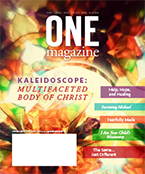
June-July 2019
Kaleidoscope:
The Multifaceted
Body of Christ
------------------
|





INTERSECT
Kept in Love | Jude 22-23
Several years ago, a well-known atheist named Penn Jillette released a video in which he described beliefs and proselytizing:
I’ve always said that I don’t respect people who don’t proselytize. I don’t respect that at all. If you believe that there’s a Heaven and a Hell, and people could be going to Hell or not getting eternal life, and you think that it’s not really worth telling them this because it would make it socially awkward—and atheists who think people shouldn’t proselytize and who say just leave me alone and keep your religion to yourself—how much do you have to hate somebody to not proselytize? How much do you have to hate somebody to believe everlasting life is possible and not tell them that? I mean, if I believed, beyond the shadow of a doubt, that a truck was coming at you, and you didn’t believe that truck was bearing down on you, there is a certain point where I tackle you. And this is more important than that.
His logic is sound. And it ought to be sobering to us. It is interesting Jillette used the word hate—How much would you have to hate somebody to believe everlasting life is possible and not tell them that? He’s right. But let me turn it around: What is the expression of true love? Love is the motivation for telling others about Jesus. In fact, this is the central message of these verses in Jude: You are kept in the love of God to reach out with the love of God.
Context of Jude
Jude writes, under the inspiration of the Spirit, with a pastoral concern. The recipients of his letter were not fully aware of the spiritual dangers surrounding them, primarily in the form of false teachers. He urged these believers to “contend for the faith that was once for all delivered to the saints.” On the heels of this memorable phrase, Jude supplies the reason, “For certain people have crept in unnoticed who long ago were designated for this condemnation, ungodly people, who pervert the grace of our God into sensuality and deny our only Master and Lord, Jesus Christ.”
Jude provides a series of comparative illustrations of privilege, presumption, and judgment in verses 5-16. Then, Jude defines the response from the church—the community of believers—in the face of opposition and deception from the false teachers.
Jude’s central command to believers is to “keep yourself in the love of God.” But, we must remember this is only possible because God empowers and keeps us. Three times in this short letter, the idea of keep or keeping is brought to our attention. Verse three indicates we are kept or preserved by Jesus Christ (or for Him). And the letter closes with a look to the future: He is able to keep or preserve you from falling and to present you faultless before His presence.
Between our conversion to Christ and this eventual presentation in glory, Jude presents two basic responsibilities for every believer: 1) to keep ourselves in the love of God, and 2) to reach out to those around us. In the remainder of this article, we will examine Jude’s advice for carrying out the first of these responsibilities.
“Keep Yourself in the Love of God”
Building your most holy faith. Jude tells his readers to keep themselves in the love of God by building their faith. This command is both personal and subjective. To possess real, saving faith, it must be personal and inward. However, this command also refers to the objective, unchanging body of truth believed—thus, the earlier admonition to contend for the faith once and for all delivered to the saints. The body of Christian faith isn’t emerging or evolving. Instead, it is objective and unchanging—hence, the call to contend for “the faith.”
We find an intensely interpersonal dynamic in this exhortation. In the Western world, we think primarily in individual terms. I hear “building yourselves up” and automatically think about what I can do to build myself up. Certainly, we have spiritual exercises we can do in private, but it seems clear in this passage the emphasis is on what happens between believers—that we are habitually and consistently building one another up in the faith.
Our church has been in a building project for some time, under the capable leadership of our building committee. The committee carefully selected contractors and builders and hired them to construct the new facility. That’s great for a physical building, but we cannot hire out the building of our most holy faith. We must be involved ourselves, and with other believers.
Praying in the Holy Spirit. Here, Jude presents a contrast between believers who possess the Spirit and therefore can pray in the Spirit versus those who are devoid of the Spirit. I’ve never met a praying Christian who strayed far from God. Want to stay in close communion with God? Continue faithfully praying in the Spirit.
Waiting for the mercy of our Lord Jesus Christ. We typically do not like to wait for anything. We don’t choose the longest line at the store. Most drivers seek to get in the fast lane, and few things are more frustrating than a slow fast food restaurant!
Our culture doesn’t help us with waiting—it has conditioned us to be extremely impatient. However, in another sense, the temporary nature of this world makes us long for the return of Christ. Some things are worth waiting for, and in this case, the mercy of Jesus is our goal. We anxiously anticipate the second coming of Jesus. In the meantime, we assume a posture of waiting…anxiously. We understand that this waiting involves His timing, not ours.
As those who have been redeemed, we have experienced His mercy and lovingkindness. We have a foretaste of what we will experience fully on the last day. We are on the road of mercy, following the path that leads to eternal life. It is a current possession and also a future promise.
The rise of navigational apps has made driving without a map possible—at least until Siri™ leads you astray. Recently, a massive landslide on one of the primary Nashville interstates made traffic almost insufferable. As highways slowed to a crawl, my phone app sent me a direction I wouldn’t have planned to go—a step of faith, so-to-speak. I was both traveling and believing the new route would take me to my desired destination. My journey was leading me somewhere specific. In much the same way, as we drive the road of mercy and lovingkindness in faith, the route is leading to eternal life.
If Jude’s letter ended here, we might conclude it somewhat inward focused. Keep yourselves in the love of God. He is keeping you, and you need to keep on obeying. But there is more to these verses, and we will explore reaching out in His love in the next issue.
About the Writer: Dr. Barry Raper pastors Bethel FWB Church near Ashland City, Tennessee. He also serves as program coordinator for ministry studies at Welch College and is a member of the Tennessee Christian Education Board. Barry and his wife Amanda have five children: Hannah, Tre, Emma, Caroline, and Elijah.
|
|

